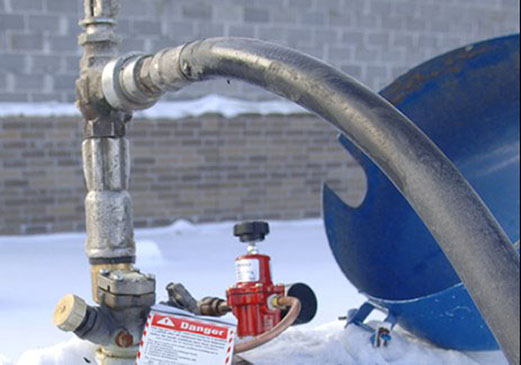How to safely use propane on a construction site
Construction sites are busy places. From the constant sounds of power tools to the sights of workers on ladders and scaffolding to the smells of sawdust and fresh paint, there’s always plenty for the senses to take in. With deadlines to keep and budgets to meet, there’s also a sense of urgency among workers at construction sites and a constant pressure to always keep things moving.
There are a number of helpful uses for propane at construction sites, including temporary heat applications, standby generators to provide electricity for lighting and power tool battery charging, and fuel for forklifts used to quickly and easily get heavy equipment from point A to point B.
One of the reasons propane has long been a fixture at residential and commercial construction sites alike is not just that it’s capable of fueling a number of helpful applications, but that it’s also able to do so safely.
Propane is naturally odorless and nontoxic, so processors add a chemical odorant called ethyl mercaptan to help users detect leaks. It is recognized by the Environmental Protection Agency (EPA) as nontoxic and a non-contaminant of air, water and soil. By comparison, fuels like diesel and gasoline contain harmful chemicals, and ethanol is both highly flammable and corrosive. Propane has a much narrower range of flammability and a much higher ignition temperature than gasoline and many other alternative fuels. Propane cylinders are also tested to be 20 times more puncture-resistant and to withstand four times the operating pressure of gasoline and diesel tanks.

One way propane really shines at construction sites large and small is when the walls go up, transforming what was once an outdoor space to an indoor one. Propane space heaters are designed for both indoor and outdoor use and are versatile enough to keep hard-to-heat areas warm for long periods. Most propane heaters approved for indoor use come equipped with safety features for your protection, such as low oxygen sensors, overheat protection, and automatic shutoff.
Helpful propane safety reminders for job sites provided by the Propane Education & Research Council can be found here. Propane safety information can also be found in National Fire Protection Association (NFPA) No. 58, “Standard for the Storage and Handling of Liquefied Petroleum Gases,” applicable Occupational Safety and Health Administration rules, and any additional rules from the local authority having jurisdiction.
Not receiving easy, hassle-free propane service at your job site? It’s simple to make the switch to Ferrellgas! Connect with a Ferrellgas Account Manager today!
CATEGORIES
Archives
- Summer 2025
- Spring 2025
- Winter 2024
- Fall 2024
- Summer 2024
- Spring 2024
- Winter 2023
- Fall 2023
- Summer 2023
- Spring 2023
- Winter 2022
- Fall 2022
- Summer 2022
- Spring 2022
- Winter 2021
- Fall 2021
- Summer 2021
- Spring 2021
- Winter 2020
- Fall 2020
- Summer 2020
- Spring 2020
- Winter 2019
- Fall 2019
- Summer 2019
- Spring 2019
- Winter 2018
- Fall 2018
- Summer 2018
- Spring 2018
- Winter 2017
